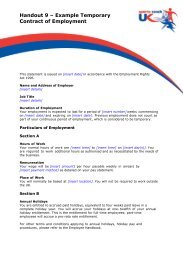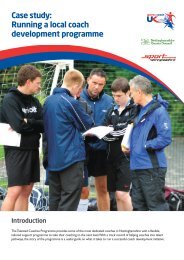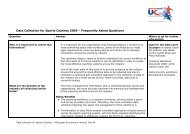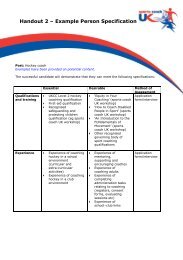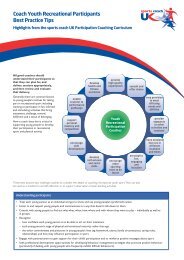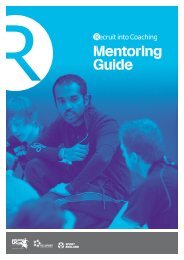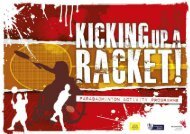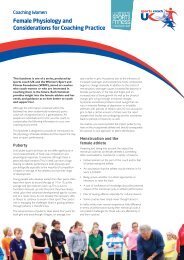Creating a Mentoring Programme for Sport: A ... - sports coach UK
Creating a Mentoring Programme for Sport: A ... - sports coach UK
Creating a Mentoring Programme for Sport: A ... - sports coach UK
Create successful ePaper yourself
Turn your PDF publications into a flip-book with our unique Google optimized e-Paper software.
<strong>Creating</strong> a <strong>Mentoring</strong> <strong>Programme</strong> <strong>for</strong> <strong>Sport</strong>51With regard to the scope of the outcome, createsome realistic boundaries. Do not identify outcomesbeyond your programme’s reach. Possiblecharacteristics to use in narrowing an outcome’sscope include:• geography (people in a county/region)• sport (multi- or specific)• age (18–25 rather than adult learners 18+)• ethnicity or cultural background(minority groups)• other characteristics of the people to betargeted (part-time workers or those in aparticular role).Activities, outputsand resourcesThe time has come to talk figures! Project targetsspecify the volume and/or quantity of activities andthere<strong>for</strong>e achievements the programme is expectedto deliver. Outputs and activities provide abenchmark against which you can measure andmonitor your project’s progress.ActivitiesIn order to achieve the outcome of your mentoringprogramme, what activities need to occur, and what‘things’ need to happen? Activities are the ‘things’ thatyou provide, such as training, products and supportservices, with common activities including:• awareness-raising events – conferences, thinktanks, demonstrations and product trials/pilots• service provision – technical consultancy,research, planning and development, fieldwork(visits to <strong>coach</strong>es), assessment of circumstances• resource development – publications includingcurriculums, articles, bulletins, fact sheets,handbooks, web pages, guides, models andcase studies• training and education – organised trainingevents such as short courses, clinicsand workshops• engaging advocacy – conducting public focusgroups, <strong>for</strong> example• media work – communications, marketing andpromotion (including promotional material)• infrastructure building – strengtheninggovernance and management structures,relationships and capacity.Describing the activities you will undertake allowsyou to establish links between the investmentsrequired (inputs) and the intended impact (outputs)of the programme.OutputsOutputs are the measurable, tangible and directproducts or results of programme activities. Theyhelp you assess how well you are implementingthe programme.Whenever possible, express outputs in terms of thesize and/or scope of services and products deliveredor produced by the programme. They frequentlyinclude quantities or reflect the existence ofsomething new. Examples of programme outputsinclude numbers and descriptions of:• workshops delivered• workshop attendees• <strong>coach</strong>es reached through the service• mentoring hours provided• partnerships <strong>for</strong>med• focus groups held.Reflecting on the points outlined above, what arethe outputs associated with your programme?What are the activitiesassociated with yourprogramme (ie specificproducts and activitiesthe programme willdeliver)?What are the targets(ie the volume orquantity of activities andachievements that theprogramme is expectedto achieve)?Note that these targets reveal little about quality,highlighting only what has been achieved, rather thanhow well it has been achieved. However, collatingdata from the various recipients of your mentoringservices (participants, <strong>coach</strong>es, decision makers etc)such as that outlined below will aid this process:• recipient reflections• characteristics or behaviours (be<strong>for</strong>e and after)• learning gained from experiences• level of satisfaction with the programme.Resource costsWhat resources (both human and tangible) will berequired to deliver/undertake the activitiesassociated with your programme?The scale of the programme and the resourcesneeded (or available) to manage it are major factorsto take account of when estimating programmecosts. The major costs are often associated withstaffing, particularly if you are going to employ aprogramme coordinator and intending to pay thementors <strong>for</strong> their work. You will need to takeaccount of salaries, tax, national insurance andpensions. Even if you are using a volunteerwork<strong>for</strong>ce, you will need to consider items such asincentives, expenses and insurance.A





